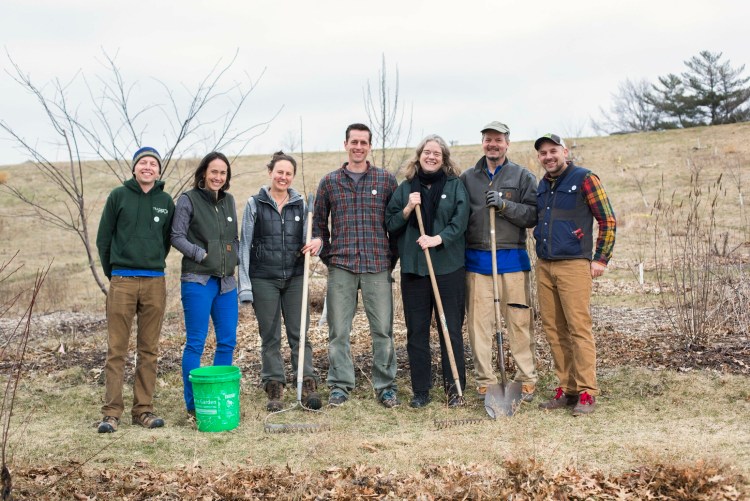A few years ago, an army of 35 Resilience Hub volunteers showed up at Jasa Porciello’s house on Munjoy Hill in Portland and went to work transforming her tiny backyard from a manicured lawn into an edible landscape. It was, she said, “like an Amish barn raising.”
Volunteers for the group operation, known as a “permablitz,” layered the topsoil, inoculating it with mushrooms to help take up the lead in the soil. They planted cherry and peach trees, mint and spinach. Right away, Porciello – a grant writer and previously unsuccessful gardener – noticed more squirrels and insects in her yard, and more birds flying in to eat the insects.
The Resilience Hub, dedicated to regenerating land, growing healthy food and building resilient communities, is the winner of this year’s Cultivator Award. Since 2005, the Portland-based nonprofit has been organizing educational workshops, permaculture design courses and permablitz work parties all over the state, averaging 70 events per year. More than 3,000 people are members of the group’s online community.
Permaculture is a form of landscape design that follows ecological principles and provides food for people as well as wildlife, pollinators and soil microorganisms. Since 2008, The Resilience Hub has graduated more than 300 people from its permaculture design course. It also has partnered with the city of Portland to use permaculture techniques for planting fruit trees and vegetable gardens on public spaces around the city.

Kate Wallace is the programming director of the Resilience Hub in Portland. Derek Davis/Staff Photographer
When Kate Wallace, program director for The Resilience Hub, drives around Portland and its suburbs, she sees its scrubby hillsides covered in invasive plants and weeds, and thinks “wow, what an opportunity.”
“There are lots of yards that are lawns,” she said, “and there’s just so much potential for productive landscapes and growing food in small spaces.”
This year, The Resilience Hub plans to hold six permablitz parties, dividing them equally among public and residential sites, Wallace said. The three public sites will be the Mt. Joy Orchard, Harborview Park and the Boyd Street Community Garden, all in Portland. While the land at these work parties is “totally transformed” in just a single day, Wallace said, “it’s also an incredible human experience.”
Wallace said Resilience Hub volunteers range from avid gardeners who “nerd out” on permaculture concepts to people who are “just hungry to get their hands in the dirt, and also to meet their neighbors and create a meaningful connection.” That’s especially important now, at a time when the country is so divided. Wallace said interest in permaculture tends to cross political lines; she’s worked on permaculture designs with both “hardcore Trump supporters” and “liberal, hippie people.”
“Ultimately we’re going to have to come together,” she said. “The problems we’re facing are really massive.”
As for Porciello, she doesn’t mow her yard any more. She’s learned how to prune, and how to graft a crab apple tree. She tends to the topsoil herself, spreading coffee grounds she gets from a local coffee shop (earthworms love to feast on them) and laying down cardboard that keeps light from the weedy undergrowth.
Porciello says she’s been “amazed” at the yield from her tiny patch of land, about a tenth of an acre. She still has currants in her freezer that she harvested last year, and her peach tree yielded so much fruit she gave a lot of it away. “I don’t intend to share my peaches with the squirrels,” she said, “but they help themselves.”
This year, Porciello is adding more perennials to her garden, including sorrel, strawberries, Nine Star broccoli, Turkish rocket, high bush blueberries, honeyberries, a dwarf mulberry, and an herb garden with herbs to please both her and her cat.
“I feel like it keeps paying me every year,” Porciello said.
Meredith Goad can be contacted at 791-6332 or at:
mgoad@pressherald.com
Twitter: MeredithGoad
Send questions/comments to the editors.



